- Home
- Andrew McGahan
1988 Page 22
1988 Read online
Page 22
‘What is it?’ I asked.
‘Turtle,’ Eve grinned, hanging over the side. The boat zipped and plunged, slowed down. Finally I caught a splash ahead. Then we were over it. I saw a dark-green oval shape, large, flippers working, gliding away to the depths. I watched. The turtle, I knew, was something significant. It was the official symbol of the Gurig National Park. The sign of a sea people. Russel circled the boat and there it was again, shimmering far below.
‘What’re you going to do?’ I asked Eve.
‘Nothin’. We’re just showing you. You ever seen a turtle?’
‘No. Do you catch them?’
‘Not today. Only sometimes. Turtle’s special. They’re good eating but.’
The turtle veered off. Russel let it go, turned the boat east again. The sea was wide and empty and blue. I settled back in the stern. Water splashed over the side. Allan, Russel, Eve, all of them looked back at me from time to time. Expectant in a way. Was I enjoying myself? I had no idea why they were bothering with me, why they cared whether I was happy or not, but I was. I lit another cigarette, offered them round. We skimmed over the ocean.
We arrived at Araru half an hour later. I wasn’t sure what I’d been expecting, but it was nothing like Cape Don. It was different country altogether. There were no swamps, no mangroves, no dense scrub. Instead the settlement was on a long, white beach, open to the sea. Beyond the sand was dry grassland, thinly scattered with gum trees. There was a shack visible, a shed, and some campsites. No houses. No compound. No lighthouse.
Russel ran the boat up onto the sand. There was already another boat there, and some petrol drums. We climbed out. About a dozen people were coming over to us, men, women and children. They were all Aboriginal. Allan and Russel and Eve began talking with them in Gurig. I looked around. The shack was maybe a hundred yards back. Here and there were blankets spread under trees, canvas awnings strung between the trunks. There were fireplaces, eskies, boxes of stuff. And vehicles. There was a four-wheel drive parked near the shack, a Landcruiser, and the bodies of several others around the place, stripped and rusting.
Allan was waving me over to one of the campsites. Everyone was sitting down, in the shade. I went over and sat. Introductions were made. Some of the men I already knew. Davie. Long Bob. Jerry. And Con, the one Wayne had shared the joint with, back at Cape Don. The women, though, I’d never met. Vonnie. Cathy. Hilda. And Dulcie. Dulcie. The name was familiar from somewhere. She looked about thirty, big, smoking a cigarette.
I said, ‘Is that your name written on the wall in the house at Cape Don?’
She looked at me for a moment. Then she laughed. ‘The school? Hah. I’d forgotten about that. How high am I? Miss Andrea made us do that.’
‘She was the teacher?’
‘Uh-huh. Poor thing, she never looked very happy.’
‘I’m living in that house now.’
‘Yeah? Good luck. I hated the place.’
The others laughed. I sat back, waited. Conversation flowed around me. Most of it was in Gurig. I smoked cigarettes and watched. After a while Allan and Russel and the other men went off towards the shack, talking. I stayed with the women. Three young children ran about, screaming and playing. Eve chased after them. I realised there were no teenagers around. Only the kids and the adults.
I lay back, stared at the sky. I began wondering exactly what I was supposed to be doing there. Nothing was happening. Maybe nothing would. Still, it was better than weather observing. The day was fading into afternoon. There was a warm breeze. The sound of ocean nearby. I decided it didn’t matter what I was doing there. This was fine.
The men came back.
‘C’mon,’ Allan said, ‘We’re going fishing.’
‘Oh. Okay.’
I got up. Allan and Russel and I climbed back in the boat. I saw that the rest of the men were piling into the Landcruiser, and that they had several guns. Allan noticed me watching.
‘They’re after meat,’ he said, ‘We’re after fish.’
We sailed off south along the beach. The sun sank low. Eventually the beach gave way to mangrove. We came to the mouth of a creek. Russel steered us slowly inwards. The creek narrowed, split into two channels. We went along the thinner one. The mangroves closed in, all twisted black trunks and branches, mud glistening in between. Sandflies rose in clouds. Allan handed me some insect repellent.
I said, ‘What sort of fish are we after?’
‘Barramundi.’
There were lines and reels in the boat, but they weren’t being unrolled. Allan and Russel had thin wooden spears. I’d seen this sort of thing on television before, but never first-hand. I was surprised anyone still did it for real. I looked over the side. The water was clear, only a foot or two deep. The boat slowed to a stop. We waited in silence.
Russel nodded to me, ‘Here.’
I looked. There was a fish down there, drifting around above the sand. It wasn’t very large. I didn’t know what Barramundi looked like. Russel raised his spear, studied the fish. I remembered things about water and refraction. Did you aim in front, or behind? Russel drove down with the spear. There was a splash and a flurry. The spear came out again. There was nothing on the end of it. Allan laughed.
‘Big Barra there Russ.’
Russel shrugged, smiled.
They fished until it was almost dark. It was very quiet, only the odd word from Allan or Russel, the bubble of the motor. Moisture dripped from branches. No one speared any fish. I didn’t much care. I was staring out to either side of the boat, watching the mangroves. The creek wound through them, curling in slow loops, dividing again and again into new channels. There was no end to it.
Eventually it was too dark to see the bottom. Russel began threading his way out. I had no idea where we were. Allan scrabbled about in the bottom of the boat, found a torch, flicked it on. He shone it around. Ghost shapes stood out, flecks of deep green.
‘Keep a lookout Gordon,’ he said, ‘Bit of luck we’ll show you some crocs.’
There was no moon yet, just the dim stars. The channel was only faintly visible, twisting and turning. Allan stood in the bow. From time to time he searched the shoreline with the torch.
‘You’ll see the eyes first,’ he told me, ‘Big, orange eyes.’
And then there they were. Up ahead. Two glowing points that disappeared in a blink, appeared again. Then another set. We eased forward. Allan kept the torch on. Finally I could see them, two crocodiles. They were crouched in the mud at an open section of the creek bank. The nemesis of my Cape Don dreams.
We passed only a few yards away. They weren’t very big, only nine or ten feet. Nor did they lunge at the boat or slither off into the water. They lay dead still in the circle of light and watched us. All the fear I had stored up, it had nowhere to go. The crocodiles fell behind. One set of eyes blinked out, then the other.
Allan was at my ear. ‘Just little fellas, eh? Step in that mud but, just you and them, then they’re big.’
We returned to Araru in full night. I could see fires burning. There was an electric light in the shack, and I could hear the thin whine of a small generator. Yells were exchanged across the water as we landed. The other men’d had more luck. They’d shot and slaughtered one of the banteng cattle, there was plenty of meat.
We all gathered around one of the fires. There was a large hotplate over the coals. On a stretch of canvas there were huge sections of freshly cut meat. Bones were showing, hairy skin still attached around the joints. Blood pooled beneath. There was also salt and butter. Various bottled sauces. Loaves of bread. Old soft drink bottles full of water.
I waited. Ants and other insects crawled over the meat, feasting. Then the women swept them away. They started slicing off chunks, throwing them on the hotplate. A cask of wine appeared and began doing the rounds. We sucked from the nozzle. Small sips. The women looked at me, gestured at me to take food. I snatched some slices of the meat from the fire, some bread. The bread was stale, but the meat
was hot, crisp on the outside, warm and bloody on the inside. I was hungry and it was superb.
Then the women began throwing other, smaller cuts on the hotplate. I assumed these were choice pieces. Liver. Kidneys. I saw the heart. It was huge and whole. Blood still oozed from the arteries. It sizzled, rolling around the plate for a while. Then it was pulled off by one of the women. It was Dulcie. She gripped it in her hand, took a huge bite, right into the muscle. She chewed, juices dripping down her cheeks. She looked around the group, caught my eye.
‘Gordon,’ she said, offering the heart, ‘You want some?’
I thought, hesitated, shook my head.
She laughed. Everyone laughed. The heart did the rounds.
The night aged. The meal was finished, the spare meat carted away. The group sat around the fire, talking, sipping on the cask. Occasionally the talk switched to English, and I was asked a few questions, but not often. People began drifting off to other camps, or the shack. Allan came over to me.
‘You sleep here, okay.’
‘Okay.’
‘If you walk around at night, keep off the beach. Crocs there sometimes.’
‘Uh-huh.’
‘So, you like it here?’
‘Yes. I do.’
‘Good. Cobourg’s not so bad eh. Maybe you might wanna stay, over at that lighthouse.’
He went off. I was more or less alone, no one else was bedding down close to me. I opened the sleeping bag and spread it on the ground. It was too warm to get inside it, I lay on top. People wandered around for a while, then everyone was settled. Silence fell. I watched the glowing remains of the fire. Stay on at the lighthouse? What had Allan meant by that?
I didn’t dwell on it. I rolled on my back and looked at the stars, billions of them, bright in the sky. I felt full and satisfied and tired. Even the boils felt better. Maybe salt air was all it took. Maybe it was just the escape from Cape Don. I didn’t know. I didn’t care. Everything about my life seemed distant and small. I listened to the breeze, and the sea, and the odd, soft mutter from the other camps. Then, at some point, I slept.
THIRTY-SIX
Everyone was up early. The morning was bright and cool. People went here and there, cooking their breakfasts. I ate, then lay in the shade, waiting for nothing. My mind was blank. I didn’t think about Cape Don, my writing, anything. Only the ground under my back, and the low boom of the surf. No one came near me. Finally I was bored.
I got up, explored the camp. First the shack. It was very simple in design. Tin walls, post frame, concrete floor. There was a large room that contained a freezer, a table, some chairs and a two-way radio. Off that opened three small bedrooms. The floor of each bedroom was covered with mattresses. Probably twelve or fifteen people could squeeze in there, if it was the wet season and there was nowhere else to go.
Outside there was the generator, a pump at the head of a well, a toilet and a shower. And further off, all the derelict four-wheel drives. I asked Allan about them. He said that while there were no real roads to anywhere from Araru, there were a few bush tracks. They led to important sites and some good hunting grounds. It was hard on the vehicles though, so none of the four-wheel drives lasted long. New ones were delivered by a big ocean-going barge from Darwin. They were expensive.
He took me back to the shack and dug around in a box under the table. He came up with a bunch of papers. He showed them to me. They were bills. For food, petrol, transport. Social Security statements. Old tax forms. Some for individual people, some for the Gurig people in general.
‘You know about this stuff?’ he asked.
‘No.’
‘Pain in the arse eh.’
I nodded. I’d known, I supposed, that things couldn’t be as simple as they looked around Araru. Money still had to be made. And there had to be a school around somewhere, either at Black Point or on Croker. And medical services, and some way of organising banking. And lawyers and accountants, for park business. And a store too, of some sort. For the bread and the butter and the wine and the cigarettes.
‘We owe a lot of money,’ said Allan.
‘Do you make enough to cover it?’
‘We will, once we get this resort. Have to get training though, for the business side.’
I nodded.
He looked at me. ‘Never know. Someone like you might wanna work in a place like that.’
I was surprised. I said, ‘I don’t really know anything about business.’
He shrugged. ‘Well, years off yet.’
He left it at that. I went back outside, sat. I was confused. I couldn’t see why Allan was talking to me about these things. I was young, I didn’t know anything, and I was from Brisbane.
Time passed. Then around midday there was a stir in the camp. A boat was pulling up on the beach, another dinghy. It held two aboriginal men, one of them quite old. They climbed out and talked with Allan and Russel. It seemed important. Allan then spoke to everyone else in Gurig. They all headed off, started collecting their gear.
Allan came over. He told me that the two men had come from Croker. It turned out that the old cousin over there had finally died. Everyone at Araru was needed over at the island, to begin the funeral rites.
‘How far is it?’ I asked.
‘You can’t go. It’s private.’
‘Oh.’
‘Not tonight anyway. Maybe later. You stay here.’
‘Oh . . . okay.’ I was alarmed. Left alone again. Cape Don had been bad enough, but at least I’d had my own house, and books and a stereo. At Araru there was nothing.
Allan was grinning. ‘Not just you. Con, he’ll be here too. He’s Tiwi, not Gurig. This funeral’s nothin’ for him. And Hilda. She’s from inland.’
‘Alright. How long for?’
He thought. ‘I’ll come back with Russel, get you tomorrow. See what we can do with you then.’
‘Would it be easier to just drop me back at Cape Don . . .’
‘No, you stay here. One night’s not enough.’
‘Okay.’
Croker was miles away, right over the other side of the peninsula. By boat, it would be two hours from Araru at least. It seemed a lot of travelling back and forth. Still, it was Allan’s decision, not mine. I watched while everyone loaded themselves into the three boats. Con came over and stood with me.
‘Just you and me,’ he said.
‘And Hilda.’
‘Bring any of that gunja?’
‘No.’
‘No worries, I got wine hidden, back in the bush. We’ll get pissed tonight, okay?’
‘Okay.’
They were ready to leave. Allan came over again. He was carrying a rifle, a 303 with a scope. Allan gave it to Con, along with handful of bullets. They spoke together for some time. Allan was serious, Con was nodding, smiling. Then Allan went back to the others, and the boats pushed off into the surf. They motored up and headed north.
‘What’s the gun for?’ I asked Con.
He swung it round, aimed at my head. ‘We might need it.’
The afternoon was slow. Con and I sat on the beach and talked and smoked. It wasn’t an easy conversation. Con spoke for a while about Cobourg and Melville Island, but mainly it was about Darwin and his time in prison. The men he’d fought, the women he’d fucked, the people he’d fooled. I had little to say in comparison. I’d never been in prison, was useless around violence. Still, there was no one else for company. Hilda was about somewhere, but I hadn’t seen her.
Towards dusk Con went off and brought back two casks, one of claret, one of port. We started drinking, watching the sun go down. The wine was flat and hot and again we drank it straight from the nozzle. I wasn’t enjoying it, but the sooner I got drunk, the sooner I might get to sleep. Sleep seemed like a good option. Once it was fully dark, Con told me we should move away from the water. There was the chance of crocodiles.
We took the casks and wandered up to the shack. The generator and the lights were on. Hilda was inside, sitting
at the table. She was a large woman, young, with wide dark eyes. I’d seen her with the other women, talking and yelling, but now she was dead quiet, watching us warily. Con said something to her, not in English, laughed. She didn’t reply.
There was an electric frypan on the bench. It was greasy from old meals. Con rummaged around in the freezer and came up with a joint of meat. We sliced off cuts and cooked them. We passed the casks back and forth. Hilda had a few pulls, ate with us, didn’t talk. Outside was the great, empty night. Inside the shack it was close and hot. The hours crawled by. I grew drunk. Con was drunker.
‘You ever killed any banteng?’ he asked me.
‘No.’
‘You wanna?’
‘Now?’
‘Yeah. Now. We got the gun.’
Hilda said something in Gurig. Con snapped back at her, shoved her shoulder. She went quiet. He shoved her again. Waved his hand towards the bedrooms. Yelled at her. She got up. Went.
Con hefted the cask. Grinned at me.
‘Don’t worry ‘bout her. We’ll go later.’
‘Sure.’
We drank. The night was getting cheap and evil, I could sense it. The bad wine, the hot small room, Hilda, none of it was what I really wanted to be doing. We were deep into the port. Mumbling. Sweating. I was wearing shorts and a T-shirt, Con was just in shorts. His fat belly hung over the top.
‘That Allan Price,’ he said, ‘He likes you.’
‘I don’t know why.’
‘He don’t like me.’
‘Why not?’
‘Reckons I shouldn’t be here.’
‘Oh.’
‘Fuck him. Big fucking man.’
‘Well he is, isn’t he?’
‘Not on Melville he’s not.’
‘Uh-huh.’
I wasn’t keen to hear this. I drank, walked around the room. Con went on. He didn’t like Allan, didn’t like Cobourg, didn’t like anything. I was beginning to hate him. I found a stack of old magazines. I began flicking through them. After a time Con got up and followed Hilda into the bedroom. There were some indistinct sounds. Thumps. Con laughing. Nothing from Hilda.

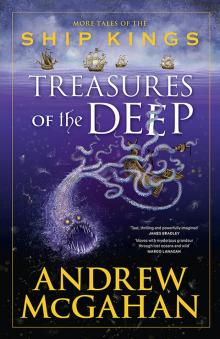 Treasures of the Deep
Treasures of the Deep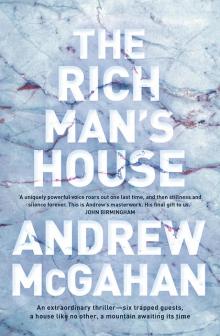 The Rich Man’s House
The Rich Man’s House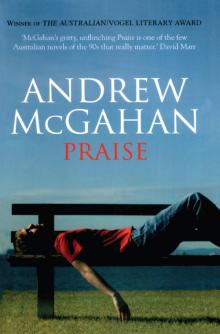 Praise
Praise The White Earth
The White Earth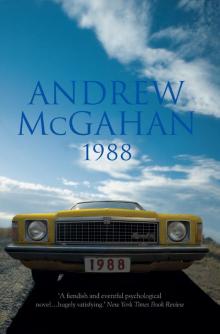 1988
1988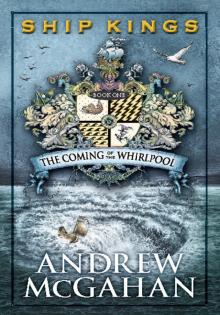 The Coming of the Whirlpool
The Coming of the Whirlpool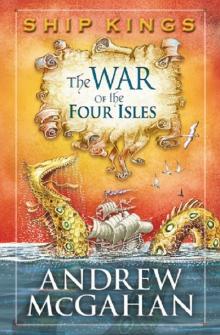 The War of the Four Isles
The War of the Four Isles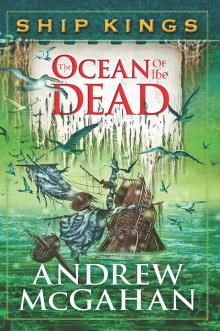 The Ocean of the Dead: Ship Kings 4
The Ocean of the Dead: Ship Kings 4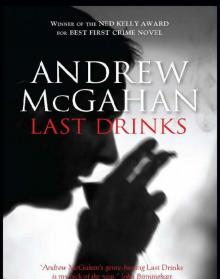 Last Drinks
Last Drinks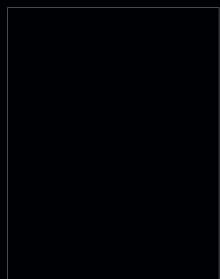 Wonders of a Godless World
Wonders of a Godless World Underground
Underground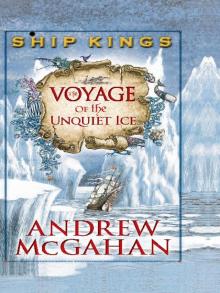 The Voyage of the Unquiet Ice
The Voyage of the Unquiet Ice